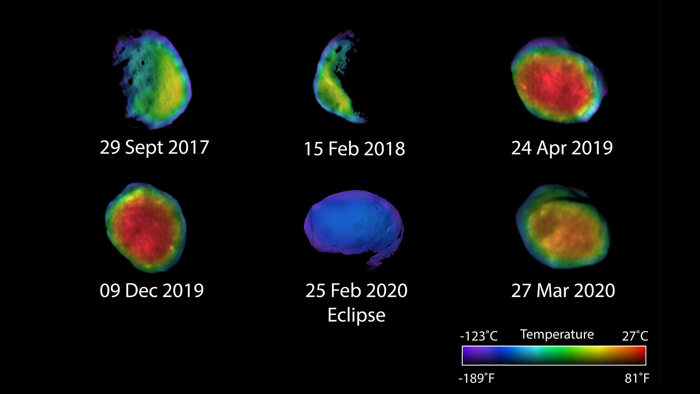NASA's Mars Odyssey probe has been orbiting the Red Planet for almost 19 years now, making it the longest continually active spacecraft in orbit around a planet other than Earth.
That incredible tour of duty means it's witnessed lots of strange things we can't easily see from our terrestrial vantage point, and this stunning, colourful composite of the Martian moon Phobos is a great example of the alien sights Mars Odyssey gets to glimpse up close.
These six rather delicious-looking circular shapes may resemble some kind of fruit-flavoured candy, but they're actually different glimpses of Phobos – with the colour variations representing different temperatures, as detected by Mars Odyssey's infrared camera, the Thermal Emission Imaging System (THEMIS).
 Temperature variations on the Martian moon Phobos. (NASA/JPL-Caltech/ASU/NAU)
Temperature variations on the Martian moon Phobos. (NASA/JPL-Caltech/ASU/NAU)
THEMIS – which shares Greek mythology ties with both Phobos and its lunar sibling, Deimos – here reveals Phobos at its coldest in blue, when the Martian moon was fully shadowed by the Red Planet during a lunar eclipse.
By contrast, the bright red centres (seen top-right and bottom-left), show the thermal signature of Phobos under full sunlight, where the lunar surface directly facing the Sun heats up to a maximum temperature of around 27 degrees Celsius (81 degrees Fahrenheit).
"[It's] a kind of temperature bullseye – warmest in the middle and gradually cooler moving out," Odyssey project scientist Jeffrey Plaut explained in 2019.
"Each Phobos observation is done from a slightly different angle or time of day, providing a new kind of data."
Ongoing analysis of Phobos and its surface features stands to reveal whether the tiny moon (with a radius of only about 11 kilometres, or 7 miles) is an asteroid that got pulled into the gravitational lure of Mars, or perhaps a lost chunk of the planet itself – a fragment that got chipped off by a surface impact in the Red Planet's mysterious past.
Lots of questions remain, and Mars Odyssey's ever-watchful eyes could be our best hope of securing the answers. We don't have forever, though: Phobos, perhaps aptly named after the god of fear, may have already booked in its date with destiny.
